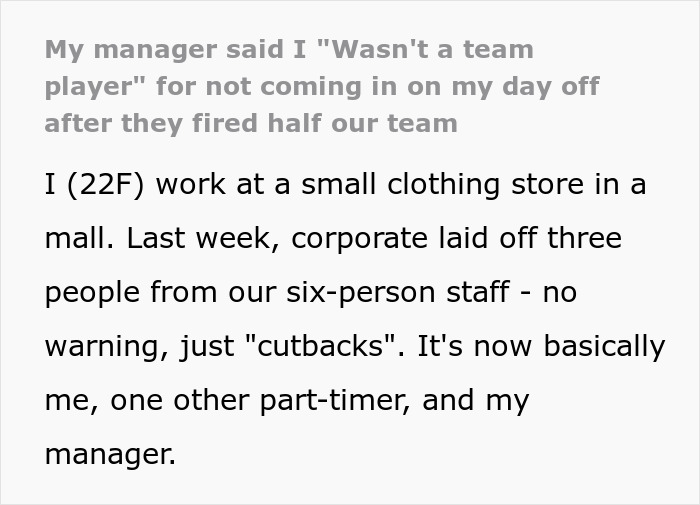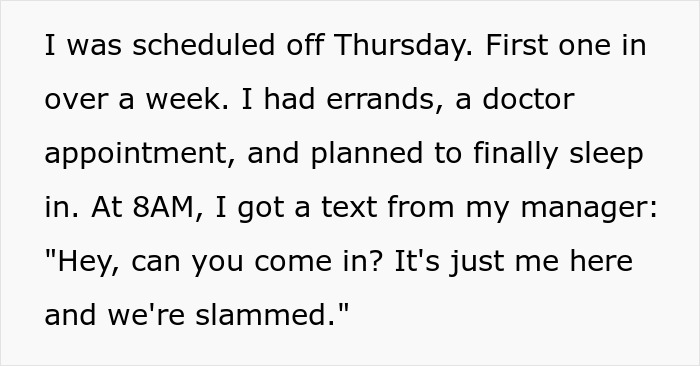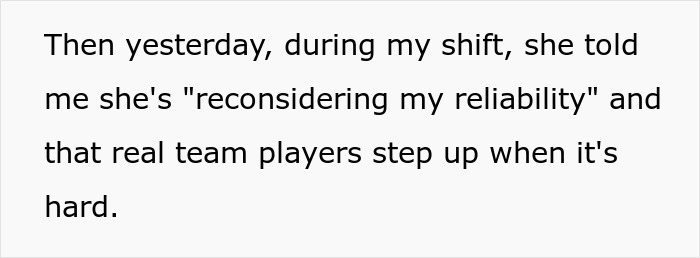Good teammates are important in the workplace. Good colleagues can make even the worst working environment a bit more bearable, so people really prioritize teamwork when it comes to traits of a good coworker. Indeed, in a Statista study, 90% of employees said that teamwork is important to them at their jobs.
But what is the extent of being a team player? Should you sacrifice your personal life and well-being? This netizen didn’t think so when she called her manager guilt-tripping her after she refused to come in to work on her day off. As the absurdity of the situation was familiar to other people, her story soon took off online.
A retail worker refused to come in to work on her day off and was accused of not being a “team player”
Image credits: Ivana Cajina / unsplash (not the actual photo)
The woman sounded off her frustration online: “I’m paid $15/hr. You don’t get to guilt me into unpaid loyalty”
Image credits: Getty Images / unsplash (not the actual photo)
Image credits: AliceWillxo
Guilt-prone people are often better employees and are perceived as good leaders
Image credits: Getty Images / unsplash (not the actual photo)
Guilt-tripping at work, on the other hand, seems severely inappropriate. Yet, ironically, those who are easily pressured into feeling guilt actually make the most terrific employees. A 2011 study by researchers at Stanford Graduate School of Business found that employees who have more tendencies to feel guilt are more likely to have better performance reviews. Their peers also perceive them as better leaders.
The researchers also concluded that guilt-ridden people are more loyal to their workplaces. For example, they were less likely to protest layoffs and would carry them out more dutifully. Those who were prone to guilt also would uphold their company’s image publicly, feeling a sort of loyalty to it.
Yet one of the study’s co-authors, Francis Flynn, wanted to emphasize that this does not mean that guilt-tripping employees is always effective. He says that the negative effects of using guilt against employees have not been studied yet, but he suggests that it might impact employees’ personal lives.
In his research, Flynn hasn’t found guilt-prone people to be more stressed or to have lower job satisfaction. He says that guilt-ridden people are perhaps more selfless. “The guilty are more willing to make charitable contributions and assist colleagues in need,” he pointed out. “There seems to be a link between guilt and positive social behavior.”
Employees are responsible for setting their own boundaries when it comes to guilt-tripping bosses
Image credits: Getty Images / unsplash (not the actual photo)
For some, going the extra mile at work seems natural. Picking up an extra shift, coming in on your day off, or staying after hours is part of being a good employee. This tends to be especially true with younger workers, as ADP Research Institute’s People at Work 2023 report found that workers aged 18 to 24 tend to put in an extra eight hours of “free” work per week.
Many of us have probably experienced guilt-tripping at least once in our lives. For example, your mom probably guilt-tripped you into babysitting your little brother or the neighbor’s kid. Such an example might not seem so bad, but guilt-tripping in general, as mental health experts note, is a manipulative tactic.
Workplace thought leader Liz Ryan suggests that managers sometimes take advantage of the more easily guilted. They know which buttons to push, and those employees who don’t have a strong backbone yet might be more easily manipulated. According to her, “It takes two to tango!”
She emphasizes the importance of setting boundaries. When it comes to working extra hours or during your days off, no excuses should be needed, Ryan says. Employees are not required to share any personal details about why they can’t make it to an extra shift or stay longer and help the manager out.
“What you have on your schedule has nothing to do with the central issue, which is that your workday is done, and you’re exhausted,” Liz Ryan explains. “Learn to say, ‘What you’re suggesting won’t work, but how about this other solution?’ Practice saying it in front of the mirror if that helps you.”
Many commenters sympathized with the employee and dragged the manager: “A pouting child”
Thanks! Check out the results:












0 Comments